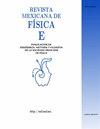SpaceMath version 1.0 A Mathematica package for beyond the standard model parameter space searches
Q4 Social Sciences
引用次数: 6
Abstract
We present a pedagogical Mathematica package, so-called SpaceMath, for Beyond the Standard Model parameter space searches. This software is directed mainly for the training of human resources related to elementary particle physics phenomenology, however, it is sophisticated enough to be used in researches. In this first version, SpaceMath v1.0 works with Higgs Boson Data whose results are the most up-to-date experimental measurements made at the Large Hadron Collider. In addition, we also include the expected results at future colliders, namely, High Luminosity LHC and High Energy LHC. SpaceMath v1.0 is able to find allowed regions for free parameters of extension models using the Higgs Boson Data within a friendly interface and an intuitive environment in which the user enters the couplings symbolically, sets parameters and execute Mathematica in the traditional way. As result, both tables as plots with values and areas agree with experimental data are generated. We present examples using SpaceMath v1.0 to analyze the free Two-Higgs Doublet Model and the Simplest Little Higgs Model parameter spaces, step by step, in order to start new users in a fast and efficient way. Finally, to validate SpaceMath v1.0, widely known results are reproduced.SpaceMath 1.0版一个用于超出标准模型参数空间搜索的Mathematica包
我们提出了一个教学Mathematica包,即所谓的SpaceMath,用于超越标准模型参数空间搜索。该软件主要用于培训与基本粒子物理现象学相关的人力资源,但它足够复杂,可以用于研究。在第一个版本中,SpaceMath v1.0与Higgs Boson Data合作,其结果是大型强子对撞机进行的最新实验测量。此外,我们还包括了未来对撞机的预期结果,即高亮度LHC和高能LHC。SpaceMath v1.0能够在友好的界面和直观的环境中使用Higgs-Boson数据找到扩展模型的自由参数的允许区域,用户可以在该环境中以传统方式象征性地输入耦合、设置参数和执行Mathematica。结果,生成了两个表作为具有与实验数据一致的值和面积的图。我们给出了使用SpaceMath v1.0的例子来逐步分析免费的两个Higgs Doublet模型和最简单的小Higgs模型参数空间,以便以快速高效的方式启动新用户。最后,为了验证SpaceMathv1.0,复制了广为人知的结果。
本文章由计算机程序翻译,如有差异,请以英文原文为准。
求助全文
约1分钟内获得全文
求助全文
来源期刊

Revista Mexicana De Fisica E
社会科学-科学史与科学哲学
CiteScore
0.80
自引率
0.00%
发文量
14
审稿时长
>12 weeks
期刊介绍:
The Revista Mexicana de Física (Rev. Mex. Fis.) publishes original papers of interest to our readers from the physical science com unity. Language may be English or Spanish, however, given the nature of our readers, English is recommended. Articles are classified as follows:
Research. Articles reporting original results in physical science.
Instrumentation. Articles reporting original contributions on design and construction of scientific instruments. They should present new instruments and techniques oriented to physical science problems solutions. They must also report measurements performed with the described instrument.
Reviews. Critical surveys of specific physical science topics in which recent published information is analyzed and discussed. They should be accessible to physics graduate students and non specialists, and provide valuable bibliography to the specialist.
Comments. Short papers (four pages maximum) that assess critically papers by others authors previously published in the Revista Mexicana de Física. A comment should state clearly to which paper it refers.
 求助内容:
求助内容: 应助结果提醒方式:
应助结果提醒方式:


